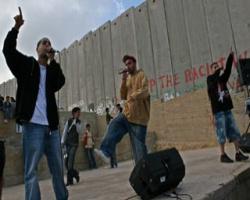For more than two decades urban American youth of all racial and ethnic backgrounds have used hip hop music to express their values, concerns, and dreams – the good, the bad, and the ugly. Whether one identifies, or even sympathizes, with any particular theme or language, one could not argue that hip hop music and its associated culture has not had a monumental impact on American youth culture. Nor could one argue that hip hop music gives anything less than a window into some of what is forming the hearts and minds of our nation’s young people despite their family background. Supporters and proponents of hip hop music have long touted the social implications of this powerful form of expression, and the world has more recently seen hard evidence of its worldwide affect.
It seems that where injustice and poverty live, hip hop is born. One of hip hop’s newest homes is another of the world’s most volatile regions: the Middle East.
A Palestine trio who call themselves DAM are leading a growing hip hop movement in the Middle Eastern Region. DAM is an acronym for “Da Arabian MCs,” Arabic for “blood,” and Hebrew for “eternity;” so even the name carries heavy social and political implications on par with that of American legends Public Enemy and Rage Against the Machine. DAM’s music might get less play than music with more commercialized themes, but their music has a point and a purpose – it focuses on the Israeli-Palestinian conflict.
Even though the influence of American hip hop is prevalent, this hip hop from the Middle East is not a copycat version of songs from the streets of L.A.; the music is in Arabic, covers Arabic themes, and is identifiably Arabic in tone and sound.
In the same way that American rappers have reacted to urban poverty and strife, these Palestinians are reacting to the poverty in their territories in the West Bank and the Gaza Strip, and making an impact on the way other young people are viewing the situation.
Bakari Kitwana, who serves as artist-in-residence at the Center for the Study of Race Politics and Culture at the University of Chicago said, “This is what hip hop does at its best, so we see young people gravitating toward hip hop, seeing their own conditions and have hip-hop giving them a voice.”
(Time 12/5)
Do you use hip hop music as a reference point for youth culture? What other windows into youth culture and concerns have you found helpful? How do you help your students engage with world issues as they make their way into youth culture?




